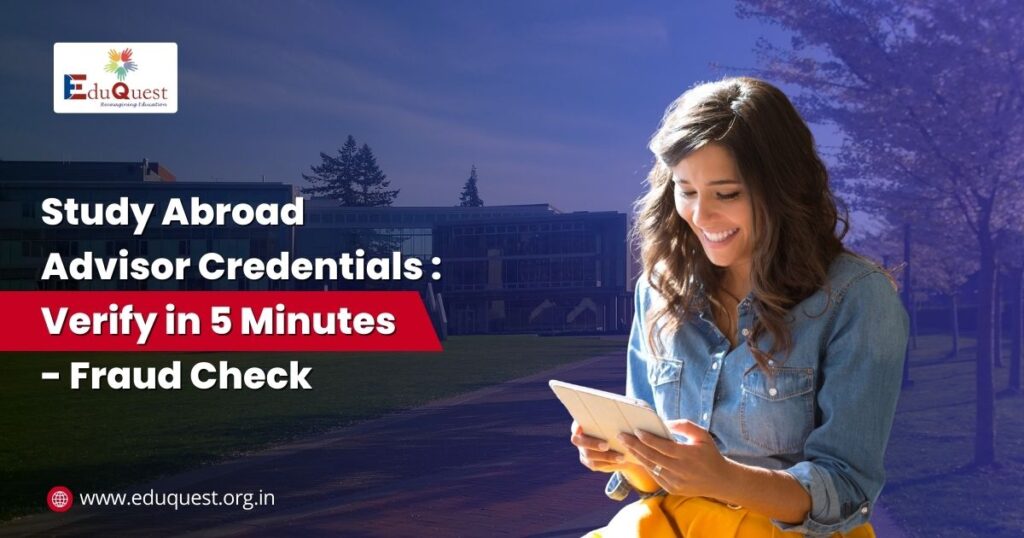At 2:47 PM on a Tuesday, Rajesh Gupta was about to transfer ₹4.5 lakhs to a study abroad advisor who promised guaranteed admission to his daughter’s dream university. Something felt off, so he decided to spend just five minutes verifying the consultant’s credentials online.
What he discovered in those five minutes saved his family from financial ruin.
The consultant’s claimed Harvard MBA was from a diploma mill, his “15 years of experience” started when he was 12 years old, and his office address led to a residential apartment. Most shocking of all, three other families had filed police complaints against him for fraud just two months earlier.
In today’s digital age, you don’t need weeks of investigation to verify whether your international education consultant is legitimate or fraudulent. With the right techniques, you can uncover the truth about any consultant’s credentials in just five minutes using nothing more than your smartphone or computer.
This quick verification process has helped over 500 families avoid consultant fraud, saving them a combined ₹2.3 crores in potential losses. More importantly, it’s helped them identify genuinely qualified overseas education consultants who actually deliver results.
The study abroad consulting industry attracts both exceptional professionals and sophisticated fraudsters. The difference between them isn’t always obvious from polished websites or impressive office spaces. But their credentials tell the real story – if you know how to verify them quickly and effectively.
The 5-Minute Credential Verification Framework
This systematic approach allows you to verify any study abroad consultant’s credentials in five minutes or less. Each step takes 30-60 seconds and can be done from your phone while sitting in the consultant’s office.
Minute 1: Educational Background Verification
Step 1.1: Check University Websites (30 seconds)
- Open the claimed university’s official website
- Navigate to their alumni directory or verification portal
- Search for the consultant’s name and graduation details
- Many universities have online verification systems for degrees
Step 1.2: Cross-Reference LinkedIn Profile (30 seconds)
- Find the consultant’s LinkedIn profile
- Compare educational details with their verbal claims
- Check if graduation dates align with their claimed experience
- Look for inconsistencies in timeline or institution names
Red Flags to Spot Immediately:
- Universities that don’t exist or have suspicious names
- Graduation dates that don’t match claimed experience years
- Missing or vague educational information on professional profiles
- Reluctance to provide specific university names or graduation years
Real Example: A consultant claimed an MBA from “Harvard Business University” – a quick search revealed Harvard Business School has never used this name, and no such institution exists.
Minute 2: Professional Association Verification
Step 2.1: Check ICEF Membership (30 seconds)
- Visit ICEF.com (International Consultants for Education and Fairs)
- Use their agent finder tool to search for the consultant
- Verify if they’re listed as certified members
- Check their certification status and any restrictions
Step 2.2: Verify Other Professional Memberships (30 seconds)
- Check AIRC (American International Recruitment Council) membership
- Search NAFSA (Association of International Educators) directory
- Verify any other claimed professional associations
- Cross-reference membership details with consultant claims
What Legitimate Memberships Look Like:
- Active membership status with current dues paid
- Specific certification numbers or member IDs
- Training completion certificates from recognized organizations
- Participation in continuing education programs
Warning Signs:
- Claimed memberships that can’t be verified online
- Expired or suspended membership status
- Fake association names that sound impressive but don’t exist
- Reluctance to provide membership numbers for verification
Minute 3: Business Registration and Legal Status Check
Step 3.1: GST and Business Registration Verification (45 seconds)
- Visit the GST portal (gst.gov.in) or use the GST verification app
- Enter the consultant’s GST number to verify registration
- Check if the business name matches their claimed company name
- Verify the registered address and business type
Step 3.2: Company Registration Check (15 seconds)
- Use the Ministry of Corporate Affairs website (mca.gov.in)
- Search for the company name in the company database
- Verify incorporation date and current status
- Check if directors’ names match the consultant’s claims
Legal Red Flags:
- No GST registration despite claiming to be a business
- Company names that don’t match their marketing materials
- Recently incorporated companies claiming years of experience
- Suspended or non-compliant business status
Minute 4: Online Reputation and Complaint Verification
Step 4.1: Google Search for Complaints (30 seconds)
- Search “[Consultant Name] + complaint” or “[Company Name] + fraud”
- Check the first page of results for negative reviews or warnings
- Look for patterns in complaints from multiple sources
- Pay attention to recent complaints or legal issues
Step 4.2: Social Media and Review Platform Check (30 seconds)
- Check Google Reviews, Facebook reviews, and Trustpilot
- Look for verified reviews vs. fake positive reviews
- Check if negative reviews have responses from the consultant
- Examine review patterns for authenticity
Review Analysis Tips:
- Genuine reviews include specific details about services
- Fake reviews often use generic language and perfect ratings
- Look for reviewer profiles and history to assess authenticity
- Multiple reviews posted on the same date are suspicious
Minute 5: Track Record and Success Story Verification
Step 5.1: University Acceptance Verification (30 seconds)
- Ask for specific student names and universities (with permission)
- Check university websites or social media for confirmation
- Look for publicly available success stories or testimonials
- Verify if claimed acceptance letters match university formats
Step 5.2: Media Coverage and Recognition Check (30 seconds)
- Search for news articles or media coverage about the consultant
- Check if they’ve been featured in legitimate education publications
- Look for industry awards or recognition from credible sources
- Verify if any claimed media coverage actually exists
Success Story Red Flags:
- Reluctance to provide any verifiable success examples
- Generic testimonials without specific details or contact information
- Claimed acceptances to universities that don’t match student profiles
- Success stories that can’t be independently verified
Advanced Verification Techniques for Suspicious Cases
If initial verification raises concerns, these additional checks can provide deeper insights:
Deep Background Investigation
Professional History Verification:
- Search previous employment on company websites
- Check if claimed work experience timelines are realistic
- Verify if previous employers actually exist and are legitimate
- Look for gaps in employment or inconsistent career progression
Academic Credential Authentication:
- Contact universities directly to verify degrees
- Check if the consultant’s claimed specializations match their background
- Verify if graduate programs existed during their claimed attendance
- Look for academic publications or research if claimed
Technology-Assisted Verification
Reverse Image Searches:
- Use Google Images to check if profile photos are stock images
- Verify if office photos are actually from their location
- Check if testimonial photos are authentic or stolen
Website Analysis:
- Check domain registration dates vs. claimed business establishment
- Verify if contact information matches business registration
- Look for professional website design and current information
- Check if claimed certifications link to legitimate sources
Case Studies: 5-Minute Verifications That Saved Families
Case Study 1: The Fake Harvard Graduate
Initial Claim: Consultant claimed Harvard MBA and 12 years of experience
5-Minute Verification Results:
- Minute 1: Harvard Business School has no record of this person
- Minute 2: No ICEF or professional association memberships found
- Minute 3: Business registered only 6 months ago, not 12 years
- Minute 4: Multiple fraud complaints on consumer forums
- Minute 5: No verifiable success stories or media coverage
Outcome: Family avoided ₹5.5 lakh fraud and found legitimate consultant instead.
Case Study 2: The Residential Address Scam
Initial Claim: Established consultancy with “premium office” in Delhi
5-Minute Verification Results:
- Minute 1: Educational claims couldn’t be verified online
- Minute 2: No professional association memberships
- Minute 3: GST registration showed residential address, not business office
- Minute 4: Several complaints about “fake office” and disappeared consultant
- Minute 5: All success stories were generic and unverifiable
Outcome: Family discovered the “office” was actually a shared residential apartment.
Case Study 3: The Legitimate Professional
Initial Claim: Experienced consultant with US university connections
5-Minute Verification Results:
- Minute 1: Confirmed Master’s degree from claimed US university
- Minute 2: Active ICEF membership and AIRC certification
- Minute 3: Proper business registration with 8-year history
- Minute 4: Positive reviews with specific details, professional responses to concerns
- Minute 5: Verifiable student acceptances and media recognition
Outcome: Family confidently engaged consultant and achieved excellent results.
Red Flags That Require Immediate Investigation
Some warning signs are so serious that they warrant deeper investigation beyond the 5-minute check:
Critical Warning Signs
Identity Theft Indicators:
- Photos that appear in multiple consultant profiles
- Credentials that belong to different people with similar names
- Professional history that doesn’t match the person you’re meeting
Systematic Fraud Patterns:
- Multiple business names operating from the same address
- Identical websites with different company names
- Copy-paste content across multiple consultant websites
Legal and Regulatory Issues:
- Active lawsuits or legal proceedings
- Regulatory warnings from government agencies
- Professional association suspensions or sanctions
Common Verification Mistakes to Avoid
Don’t Rely on These Unreliable Sources
Consultant-Provided References Only: Always verify independently rather than relying solely on references provided by the consultant.
Social Media Followers: High follower counts can be purchased and don’t indicate legitimacy.
Impressive Office Spaces: Fraudsters often invest in impressive offices to build credibility while lacking actual expertise.
Generic Testimonials: Reviews without specific details or verifiable contact information are often fabricated.
Verification Best Practices
Use Official Sources: Always verify through official university websites, government portals, and recognized professional organizations.
Cross-Reference Information: Compare information from multiple independent sources to identify inconsistencies.
Document Your Findings: Keep screenshots and records of your verification process for future reference.
Trust Your Instincts: If something feels wrong during verification, investigate further before proceeding.
Technology Tools for Quick Verification
Essential Verification Websites
Educational Verification:
- University official websites and alumni directories
- Degree verification services offered by institutions
- Professional licensing boards for certified counselors
Business Verification:
- GST portal (gst.gov.in) for tax registration
- Ministry of Corporate Affairs (mca.gov.in) for company registration
- Better Business Bureau for international consultants
Professional Association Verification:
- ICEF.com for international education consultant certification
- AIRC website for American recruitment council membership
- NAFSA directory for international education professionals
Mobile Apps for On-the-Go Verification
GST Verification Apps: Quick GST number verification while in consultant offices
LinkedIn Mobile App: Instant professional background checking
Google Lens: Reverse image search for photos and documents
WhatsApp Business Verification: Check if consultants use verified business accounts
What to Do After Verification
If Verification Confirms Legitimacy
Proceed with Confidence: Continue evaluation based on service quality and fit for your needs.
Document Credentials: Keep records of verified credentials for future reference.
Ask Detailed Questions: Use your confidence in their legitimacy to ask more specific questions about services.
Negotiate from Strength: Knowing they’re legitimate allows you to focus on service terms rather than credibility concerns.
If Verification Reveals Problems
Immediate Actions:
- Do not make any payments or sign contracts
- Document all evidence of fraudulent claims
- Report to relevant authorities if fraud is suspected
- Warn other families who might be considering the same consultant
Next Steps:
- Continue your search with other consultants
- Use lessons learned to improve your verification process
- Share your experience to help other families avoid similar issues
Building Long-Term Protection
Creating Your Verification Checklist
Develop a standardized checklist for evaluating all study abroad services:
Essential Verifications:
- Educational background confirmation
- Professional association membership
- Business registration and legal status
- Online reputation and complaint history
- Success story verification
Additional Checks for High-Value Engagements:
- Deep background investigation
- Reference calls to previous clients
- Verification of claimed university relationships
- Financial stability and business history
Staying Updated on Industry Changes
Monitor Industry News: Stay informed about new regulations, certification requirements, and industry standards.
Join Parent Networks: Connect with other families to share verification experiences and consultant recommendations.
Follow Professional Organizations: Subscribe to updates from ICEF, AIRC, and other legitimate industry associations.
Conclusion: Your 5-Minute Safety Net
In an industry where fraudsters can cost families lakhs of rupees and derail students’ educational dreams, five minutes of verification can be the difference between success and disaster. The techniques outlined in this guide have helped hundreds of families avoid consultant fraud while identifying genuinely qualified professionals.
Key Takeaways:
- Never skip verification – even impressive offices and credentials can be fabricated
- Use official sources – always verify through universities, government portals, and professional organizations
- Document everything – keep records of your verification process and findings
- Trust the process – if verification reveals problems, don’t ignore them hoping for the best
- Share your knowledge – help other families by sharing verification techniques and experiences
The 5-Minute Rule: If you can’t verify a consultant’s basic credentials in five minutes using official sources, they’re probably not legitimate. Genuine professionals have verifiable backgrounds that can be confirmed quickly through proper channels.
Remember, legitimate international student advisors welcome credential verification and are proud to share their authentic achievements. They understand that educated consumers make better clients and are more likely to achieve successful outcomes.
Your Action Plan:
- Practice the 5-minute verification on consultants you’re considering
- Create your verification checklist based on your specific needs and concerns
- Document your process to help other families in your network
- Report fraud to relevant authorities to protect other families
- Share success stories when you find legitimate, qualified professionals
The five minutes you invest in credential verification could save your family from financial loss, educational disappointment, and years of recovery from consultant fraud. In a decision this important for your child’s future, those five minutes are the best investment you’ll ever make.
Your child deserves genuine expertise, not impressive-sounding credentials that crumble under basic scrutiny. Use these verification techniques to ensure you’re working with study abroad consultants who have the knowledge, experience, and integrity to help your family achieve international education success.
Frequently Asked Questions
What should I do if a study abroad advisor refuses to provide credentials for verification?
Any legitimate study abroad advisor should willingly provide educational and professional credentials for verification. If a consultant refuses, becomes evasive, or makes excuses about credential verification, this is a major red flag indicating potential fraud or incompetence. Professional consultants understand that credential verification is standard practice and welcome the opportunity to demonstrate their qualifications. Immediately eliminate any consultant who won’t allow proper verification of their background.
Can fake professional association memberships be created to fool verification attempts?
Yes, sophisticated fraudsters sometimes create fake professional organizations or claim memberships in legitimate associations. Always verify memberships directly through official association websites using their member search tools. Legitimate organizations like ICEF and AIRC have searchable member directories with verification systems. Be suspicious of associations you’ve never heard of, and verify that claimed professional organizations actually exist and have credible industry recognition before accepting membership claims.
How can I verify success stories and student acceptances claimed by consultants?
Request specific details about recent student acceptances, including university names, programs, and admission years (with student permission). Check university websites, social media, or news coverage for publicly available confirmation. Ask to speak with successful students or their families directly. Legitimate overseas education consultants can provide verifiable success examples, while fraudulent ones typically offer only generic testimonials or make excuses about confidentiality when asked for specific verification.
What government agencies should I contact if I discover consultant fraud during verification?
If verification reveals fraudulent credentials or business practices, report to multiple agencies: file complaints with local consumer protection courts, contact the Ministry of External Affairs if visa-related fraud is involved, report to state consumer protection agencies, and file police complaints for financial fraud. Additionally, report to professional associations if fake memberships are claimed, and notify the GST department if business registration fraud is suspected. Multiple reports increase chances of investigation and help protect other families.
How often should I re-verify consultant credentials during a long-term engagement?
For ongoing relationships with international education consultants, perform periodic verification checks every 3-6 months, especially before making additional payments or during critical application phases. Professional association memberships can be suspended, business licenses can be revoked, and legal issues can arise during your engagement. Set up Google alerts for the consultant’s name and company to receive automatic notifications of any news or complaints. Regular monitoring protects your investment and ensures continued legitimacy throughout your relationship.













